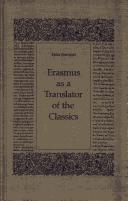| Listing 1 - 2 of 2 |
Sort by
|
Book
Year: 2019 Publisher: [Heidelberg] : Heidelberg University Publishing (heiUP),
Abstract | Keywords | Export | Availability | Bookmark
 Loading...
Loading...Choose an application
- Reference Manager
- EndNote
- RefWorks (Direct export to RefWorks)
As linguistic systems comprising a large variety of written and oral registers including derivate "languages" and "dialects," Latin and Arabic have been of paramount importance for the history of the Euromediterranean since Antiquity. Moreover, due to their long-term function as languages of administration, intellectual activity, and religion, they are often regarded as cultural markers of Europe and the (Arabic-)Islamic sphere respectively. This volume explores the many dimensions and ramifications of Latin-Arabic entanglement both from macro-historical as well as from micro-historical perspectives. Visions of history marked by the binary opposition of "Islam" and "the West" tend to ignore these important facets of Euromediterranean entanglement, as do historical studies that explain complex transcultural processes without giving attention to their linguistic dimension.
Arabic language --- Latin language --- Translating into Latin. --- Translating into Arabic. --- Europe --- Civilization --- Islamic influences

ISBN: 0802056539 1442615141 9786612039515 1282039512 1442674547 9781442674547 9780802056535 9781442615144 Year: 1985 Volume: 7 Publisher: Toronto, Ont ; Buffalo, NY ; London : University of Toronto Press,
Abstract | Keywords | Export | Availability | Bookmark
 Loading...
Loading...Choose an application
- Reference Manager
- EndNote
- RefWorks (Direct export to RefWorks)
This first full-length study of Erasmus’ translations of classical literature examines his approach to translation and, more generally, his role as a transmitter of the classics. It traces in chronological order the progress of his Greek studies and the publication history of his translations from Greek into Latin; these included selections from the works of Libanius, Euripides, Plutarch, Lucian, Galen, Isocrates and Xenophon. It also illustrates Erasmus’ methods with appropriate examples from his own texts and from those of his predecessors and contemporaries. In so doing it provides an overview of the state of Greek literature in the Renaissance.Erasmus shifted from literal translation to a more liberal approach – a change in attitude that was accompanied by a redefinition of his role as translator. In his early work he had pursued private goals, regarding his versions from secular authors as private pieces for his magnum opus, the New Testament. In later years his approach became more reader-oriented. He saw his work in terms of a service to scholarship – making Greek literature accessible to Latin readers and acting as their guide to classical thought. He was concerned not only with the mechanics of conveying the factual contents and literary qualities of the original, but also with the applicability of its moral content to Christian philosophy.This book includes a chapter on Erasmus’ New Testament version; by allowing a fuller evaluation of Erasmus’ contribution to philology, this subject adds an important dimension to the book. Erasmus’ translations of Greek texts reflect two concerns that dominated his life. As an educator he wanted to see classical philology firmly established in the curriculum of schools; as a Christian humanist he wanted to convince biblical scholars that it was an indispensable tool of their profession.
Theory of literary translation --- Classical Greek language --- Classical Latin language --- Erasmus, Desiderius --- Translating and interpreting --- Greek literature --- Classical literature --- Greek language --- Classical languages --- Humanists --- Dead languages --- Languages, Classical --- Literature, Classical --- Interpretation and translation --- Interpreting and translating --- Language and languages --- Literature --- Translation and interpretation --- History --- Translations into Latin --- History and criticism. --- Translations --- Translating into Latin --- History. --- Translating into Latin. --- Translating. --- Translating --- Erasmus, Desiderius, --- Érasme --- Desiderius Erasmus --- Erasm, Dezideriĭ --- Erasme, Désiré --- Erasmo, --- Erasmo, Desidério --- Erasmus, --- Ėrazm, --- Erazm, --- Roterodamus, Erasmus --- Rotterdamskiĭ, Ėrazm --- Rotterdamský, Erasmus Desiderius --- Роттердамский, Эразм --- Эразм, --- Ерасм, Дезидерий --- Netherlands --- Intellectual life --- Scholars --- Indo-European languages --- Classical philology --- Greek philology --- Literature, Ancient --- Latin literature --- Balkan literature --- Byzantine literature --- Translators --- Translations&delete& --- History and criticism --- Translating into Latin&delete& --- Translations into Latin&delete& --- Erasmus Roterodamus, Desiderius --- Erasmus --- HISTORY / Renaissance. --- エラスムス, デシデリウス --- Translating and interpreting - Netherlands - History - 16th century --- Greek literature - Translations into Latin - History and criticism --- Classical literature - Translations - History and criticism --- Greek language - Translating into Latin - History --- Classical languages - Translating --- Humanists - Netherlands --- Erasmus, Desiderius, - -1536 --- Netherlands - Intellectual life - 16th century --- Desiderius Erasmus, --- Erasm, Dezideriĭ, --- Erasme, Désiré, --- Erasmo, Desidério, --- Roterodamus, Erasmus, --- Rotterdamskiĭ, Ėrazm, --- Rotterdamský, Erasmus Desiderius, --- Роттердамский, Эразм, --- Ерасм, Дезидерий, --- אראסמוס, דסידריוס, --- Erasme, didier (1469-1536) --- Litterature classique
| Listing 1 - 2 of 2 |
Sort by
|

 Search
Search Feedback
Feedback About
About Help
Help News
News